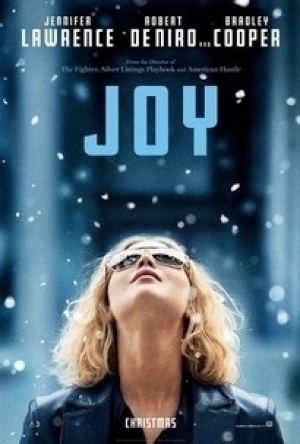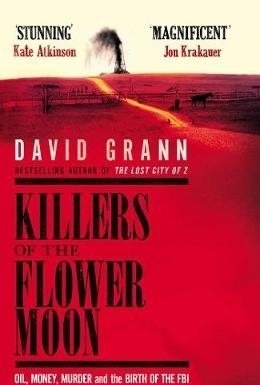Search
Search results
Gareth von Kallenbach (980 KP) rated Joy (2015) in Movies
Aug 6, 2019
Jennifer Lawrence (Joy), Robert De Niro (Rudy, Joy’s father),
Bradley Cooper (Neil Walker, Joy’s eventual boss), Edgar Ramirez (Tony,
Joy’s ex-husband), Isabella Rossellini (Trudy, Rudy’s girlfriend), Diane
Ladd (Mimi, Joy’s grandmother), Virginia Madsen (Terry, Joys mother),
and Elisabeth Röhm (Peggy, Joys half-sister)
Also making appearances that were notable to me were Susan Lucci as
Danica, a character seen on the TV soap opera that Joys mother Terry is
constantly watching, and Melissa Rivers, playing her mother Joan Rivers
on the TV channel QVC.
David O. Russel wrote, directed and produced the film, bringing the
headliners back for yet another go ‘round, after the successes of Silver
Linings Playbook and American Hustle.
Joy is a divorced mother of 2, living in a house with her Grandmother
Mimi, who she adores, her mother, who practically never leaves her room,
her 2 kids, and her ex-husband in the basement. Shortly after the film
begins, her father Rudy also moves into the basement.
Joy struggles through her life every day, never quite able to get ahead,
and always just barely making ends meet. Her grandmother has big dreams
for her and insists that Joy will “rise above” and “make something” of
her life, but Joy struggles to have faith, and indeed, to even begin to
figure out how to go about such a seeming monumental task.
The story follows Joy and her family through somewhat ridiculous
scenarios, and while it was acted well by Jennifer Lawrence, De Niro,
and most of the rest of the cast, I had a hard time really getting into
the film.
I kept finding myself wondering why Joys family wasn’t more supportive
and why they all, with the exception of her Mimi and her ex-husband,
seemed to be more trying to bring her down and keep her down, than
giving her a boost and a push up. I always have liked Robert De Niro,
but in this film found myself seriously disliking him. I suppose that
speaks to his ability as an actor and being able to portray a role in
which he is “supposed to be” less than 100% likeable.
Jennifer Lawrence as Joy shows tenaciousness, grit and a will to succeed
and “rise above”, at least once she gets to the point in the film where
she has “HAD ENOUGH” of being walked on and disregarded, and plays the
part wonderfully.
I kept hoping to like the movie better, but sadly, also kept waiting for
it to GET better.
Bradley Cooper (Neil Walker, Joy’s eventual boss), Edgar Ramirez (Tony,
Joy’s ex-husband), Isabella Rossellini (Trudy, Rudy’s girlfriend), Diane
Ladd (Mimi, Joy’s grandmother), Virginia Madsen (Terry, Joys mother),
and Elisabeth Röhm (Peggy, Joys half-sister)
Also making appearances that were notable to me were Susan Lucci as
Danica, a character seen on the TV soap opera that Joys mother Terry is
constantly watching, and Melissa Rivers, playing her mother Joan Rivers
on the TV channel QVC.
David O. Russel wrote, directed and produced the film, bringing the
headliners back for yet another go ‘round, after the successes of Silver
Linings Playbook and American Hustle.
Joy is a divorced mother of 2, living in a house with her Grandmother
Mimi, who she adores, her mother, who practically never leaves her room,
her 2 kids, and her ex-husband in the basement. Shortly after the film
begins, her father Rudy also moves into the basement.
Joy struggles through her life every day, never quite able to get ahead,
and always just barely making ends meet. Her grandmother has big dreams
for her and insists that Joy will “rise above” and “make something” of
her life, but Joy struggles to have faith, and indeed, to even begin to
figure out how to go about such a seeming monumental task.
The story follows Joy and her family through somewhat ridiculous
scenarios, and while it was acted well by Jennifer Lawrence, De Niro,
and most of the rest of the cast, I had a hard time really getting into
the film.
I kept finding myself wondering why Joys family wasn’t more supportive
and why they all, with the exception of her Mimi and her ex-husband,
seemed to be more trying to bring her down and keep her down, than
giving her a boost and a push up. I always have liked Robert De Niro,
but in this film found myself seriously disliking him. I suppose that
speaks to his ability as an actor and being able to portray a role in
which he is “supposed to be” less than 100% likeable.
Jennifer Lawrence as Joy shows tenaciousness, grit and a will to succeed
and “rise above”, at least once she gets to the point in the film where
she has “HAD ENOUGH” of being walked on and disregarded, and plays the
part wonderfully.
I kept hoping to like the movie better, but sadly, also kept waiting for
it to GET better.
Suswatibasu (1703 KP) rated Killers of the Flower Moon: The Osage Murder and the Birth of the FBI in Books
Nov 24, 2017 (Updated Nov 24, 2017)
Mind-blowing and a disconcerting read
I can say without a doubt, this is one of the best novels I've read this year. It is a disturbing and excellent real-life account of the plight of Native Americans who found themselves the unwitting beneficiaries of a financial boom in the 1920's after oil was discovered under the previously barren and worthless reservation they were moved to.
This fantastic book relates to a story covered in blood, racism and greed. Oil, black gold, made the Plains Osage tribe incredibly wealthy. By the 1890's, the remnants of this great people were in the scrub lands of Northern Oklahoma.
Their life was continually harsh, the soil poor. In the late 1890's, by chance, oil was struck in Osage County, flowing in abundance and in great demand. From 1918 to 1928, $202 million was paid to the tribe which by then numbered around 3000, transforming their lives. 680 barrels were obtained in a day in 1920 from a strike at Burbank, angering the whites and thus began the "Reign of Terror" in which hundreds of the Osage tribe members were subsequently killed in the most horrendous display of corruption.
The book itself begins in 1921 with an Osage woman who had a share of the mineral riches to be found under the Osage land. Mollie like others was subject to a law that treated her tribe as juveniles whose estates had to be administered by white guardians, that is local lawyers and businessmen, appointed by local courts.
Guardianship was unpoliced and few records were kept. Fraud was therefore prevalent and many of the local white community participated in corruption - murder was widespread as a result. Mollie's sister, Anna, was the first noticeable murder in which she was shot and killed, launching a major probe into similar killings in the area. Many other murders were committed over the following years, with poisoning as the most common method of killing. Essentially it was a covert form of genocide.
The locals refused to act, partly due to fear or involvement in this heinous plot, so J. Edgar Hoover, who was the first president of the FBI, became involved in the investigation. He sent a tall Texas Ranger called Tom White to scrutinise an epic series of murders in which even investigators were targets.
What follows is not only history but a riveting detective story and the book demonstrates yet again the enormous cost of American nationhood. It provides some fascinating insight into the early workings of the FBI (not least Hoover's nascent megalomania) for whom this was a celebrated case and a valuable reminder for folk who thought the persecution of American Indians ended in the late 19th century. Author and journalist David Grann does a superb job in collating all of the information with dozens of pages solely highlighting attributions and references - it is thorough and well-researched. Therefore it is hardly surprising that Hollywood has snapped up this book to turn it into a major motion picture - let's hope they don't whitewash history once again.
This fantastic book relates to a story covered in blood, racism and greed. Oil, black gold, made the Plains Osage tribe incredibly wealthy. By the 1890's, the remnants of this great people were in the scrub lands of Northern Oklahoma.
Their life was continually harsh, the soil poor. In the late 1890's, by chance, oil was struck in Osage County, flowing in abundance and in great demand. From 1918 to 1928, $202 million was paid to the tribe which by then numbered around 3000, transforming their lives. 680 barrels were obtained in a day in 1920 from a strike at Burbank, angering the whites and thus began the "Reign of Terror" in which hundreds of the Osage tribe members were subsequently killed in the most horrendous display of corruption.
The book itself begins in 1921 with an Osage woman who had a share of the mineral riches to be found under the Osage land. Mollie like others was subject to a law that treated her tribe as juveniles whose estates had to be administered by white guardians, that is local lawyers and businessmen, appointed by local courts.
Guardianship was unpoliced and few records were kept. Fraud was therefore prevalent and many of the local white community participated in corruption - murder was widespread as a result. Mollie's sister, Anna, was the first noticeable murder in which she was shot and killed, launching a major probe into similar killings in the area. Many other murders were committed over the following years, with poisoning as the most common method of killing. Essentially it was a covert form of genocide.
The locals refused to act, partly due to fear or involvement in this heinous plot, so J. Edgar Hoover, who was the first president of the FBI, became involved in the investigation. He sent a tall Texas Ranger called Tom White to scrutinise an epic series of murders in which even investigators were targets.
What follows is not only history but a riveting detective story and the book demonstrates yet again the enormous cost of American nationhood. It provides some fascinating insight into the early workings of the FBI (not least Hoover's nascent megalomania) for whom this was a celebrated case and a valuable reminder for folk who thought the persecution of American Indians ended in the late 19th century. Author and journalist David Grann does a superb job in collating all of the information with dozens of pages solely highlighting attributions and references - it is thorough and well-researched. Therefore it is hardly surprising that Hollywood has snapped up this book to turn it into a major motion picture - let's hope they don't whitewash history once again.

